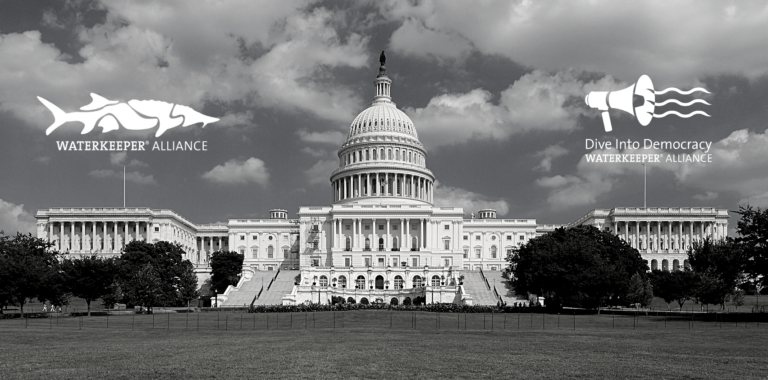
Through our Dive Into Democracy blog and email series, we informed and engaged our U.S. audience on the most pressing clean water issues of the day. In 2023, more than 33,000 people took over 63,000 actions to help protect our most valuable natural resource.
In January, we urged our supporters to leave comments with EPA demanding the strongest possible methane regulations, as a quick and cost effective way to slow the rate of climate change and protect our irreplaceable waterways.
In February, we directed concerned readers to urge EPA to reestablish concentrated animal feeding operations (CAFOs) as a National Enforcement and Compliance Initiative in order to better protect people and the environment from this serious nationwide pollution problem.
In March, on the heels of the tragic East Palestine train derailment disaster, we encouraged our supporters to contact their members of Congress to support swift passage of the bipartisan Railway Safety Act.
In April, we rallied support for urging EPA to Expand Drinking Water Protections Against PFAS Contamination by regulating six unique PFAS compounds, as opposed to the only two compounds previously regulated.
In May, together with our supporters, we urged EPA to adopt the strongest possible controls on toxic water pollution from coal-fired power plants and require full compliance with the standards within just 3 years.
Later in May, we directed our comments to President Biden and insisted he seek out a clean debt ceiling bill that both honors America’s debts and leaves the country’s environmental and public health protections intact. Later on in May, we urged the Senate to do the same.
In June, we left comments with EPA urging them to protect American air, waters, and communities from mercury and other toxic power plant pollutants by finalizing the strongest possible Mercury and Toxic Air Standards.
Once more in June, we urged our supporters to leave a comment with the U.S. Department of Transportation to swiftly finalize the strongest possible pipeline leak prevention, detection and repair rule.
In July, we petitioned Congress to swiftly pass the Reducing Waste in National Parks Act, a commonsense piece of legislation that would outlaw the use of single use plastics in our national parks and other public lands.
Later in July, we urged our supporters to contact the U.S. Environmental Protection Agency to extend strong, protective Clean Water Act water quality standards for all Tribal waters that currently lack these essential protections.
In August, we urged members of Congress to introduce and co-sponsor the Break From Plastic Pollution Act, a comprehensive piece of legislation to finally address the scourge of plastic pollution bearing down on communities and waterways throughout the country.
In September, we rallied our supporters to contact the Biden administration to pass the strongest possible version of the National Environmental Policy Act (NEPA), which requires federal agencies to assess any significant environmental impacts a federal action may have before it can begin.
In October, we urged our supporters in the state of North Carolina to contact their Department of Environmental Quality and ask them to to stop enabling the chaos that concentrated animal feeding operations (CAFOs) create in communities and waterways throughout the state.
In November, we once again drew attention to the Break Free From Plastic Pollution Act, the most significant effort on behalf of the federal government to help stem the tide of plastic pollution.